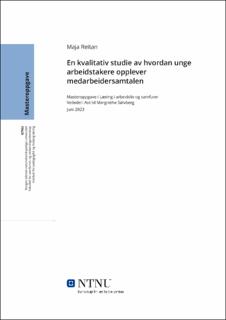En kvalitativ studie av hvordan unge arbeidstakere opplever medarbeidersamtalen
Master thesis
Permanent lenke
https://hdl.handle.net/11250/3080076Utgivelsesdato
2023Metadata
Vis full innførselSamlinger
Sammendrag
Denne masteroppgaven har som formål å undersøke hvordan unge arbeidstakere opplever medarbeidersamtalen. Særlig fokus er rettet mot den opplevde betydningen samtalen har på unge arbeidstakerens følelse av motivasjon, relasjon og tillit. De valgte fokusområdene ble utarbeidet på bakgrunn av sine sentrale roller i studiens teoretiske grunnlag.
Problemstillingen er som følger: “Hvordan opplever unge arbeidstakere medarbeidersamtalen?”
Undersøkelsen har et fenomenologisk vitenskapssyn, der forståelse av sosiale fenomener ut fra individets eget perspektiv er sentral. Jeg har valgt å forske på temaet ved hjelp av kvalitativ metode. Metoden jeg valgte å bruke for å samle inn data var et halvstrukturert intervju. Informantene hentet jeg fra eget nettverk der alle faller innenfor kriteriene: Informanten er mellom 18-29 år og har gjennomført minst en medarbeidersamtale på nåværende jobb eller i et tidligere arbeidsforhold. Jeg hadde totalt fem unge mennesker som har ulike arbeidserfaring og med ulike ansettelsesforhold. Informantenes uttalelser under intervjuer utgjør grunnlaget for datamaterialet, og videre analyse og drøfting i oppgaven.
Oppgavens teoretiske rammeverk baserer seg på litteratur om medarbeidersamtalen, motivasjon og tillit. Oppgavens teorikapittel gir en forståelse av de ulike sidene og komponentene ved medarbeidersamtalen, samt ulike teoretiske forståelser av samtalens formål og verdi. Videre i det teoretiske grunnlaget gis det nærmere beskrivelse av begrepene og valgt teori innenfor motivasjon og tillit. Disse blir videre sett i sammenheng med unge i arbeidslivet.
Funnene i undersøkelsen viser i hovedsak at unge arbeidstakere ønsker medarbeidersamtale, men er delvis misfornøyde med måten medarbeidersamtalen gjennomføres på og betydningen av samtalen. Informantene forteller om et overbruk av strukturert skjema og ønsker mer personlige samtaler og et større spillerom. De fleste informantene er åpne for at medarbeidersamtalen er betydningsfull for unge i arbeidslivet, men at samtalen, slik den blir gjennomført i dag har forbedringspotensialer. This master's thesis aims to examine how young workers experience the performance appraisal conversation. The particular focus is directed towards the perceived significance of the conversation on the young employee's sense of motivation, relationship, and trust. The chosen areas of focus were developed based on their central roles in the theoretical foundation of the study.The research question is as follows:
"How do young workers experience the performance appraisal conversation?"
The study adopts a phenomenological scientific view, where understanding social phenomena from the individual's own perspective is central. I have chosen to research the topic using a qualitative method. The method I chose to collect data was semi- structured interviews. I recruited informants from my own network, all of whom meet the following criteria: the informant is between 18-29 years old and has undergone at least one performance appraisal conversation in their current job or a previous employment. I had a total of five young individuals with different work experiences and various employment conditions. The informants' statements during the interviews constitute the basis for the data material, and further analysis and discussion in the thesis.
The theoretical framework of the thesis is based on literature on the performance appraisal conversation, motivation, and trust. The theoretical chapter of the thesis provides an understanding of the different aspects and components of the performance appraisal conversation, as well as various theoretical understandings of the purpose and value of the conversation. Furthermore, within the theoretical foundation, there is a more detailed description of the concepts and chosen theories related to motivation and trust, contextualized within the context of young individuals in the workforce.
The findings of the study primarily show that young workers desire performance appraisal conversations but are partly dissatisfied with the way these conversations are conducted and their significance. The informants talk about an overreliance on structured forms and express a desire for more personal conversations and greater flexibility. Most informants acknowledge the significance of the performance appraisal conversation for young individuals in the workforce but suggest room for improvement in its current implementation.
